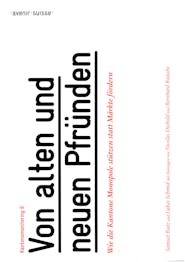The state in Switzerland enjoys a surprising range of exclusive rights. Often, these form the basis for public sector monopolies – a situation where responsibility for market access rests with the federal government, cantons or municipalities. Avenir Suisse’s sixth Cantonal Monitoring focuses on cantonal monopolies in areas as diverse as chimney sweeping, property insurance, hunting and fishing, notarial work, salt trading, official cadastral surveying and geothermal exploration. The choice of subjects is not coincidental, but determined by the fact that all have a certain relevance across cantons and all are regulated differently. Avenir Suisse’s deputy director Samuel Rutz, and research assistant Lukas Schmid, the authors, examined the usefulness of each diverse intrusion into the free market.
Insufficient federal competition
Their research brought three major conclusions:
- Assorted cantonal monopolies have long lost all relevance and justification. The monopoly on chimney sweeping and salt trading can only be described as historical relics. They cannot be justified today and should be abolished. But other areas, like notarial work, are also protectionist and could be opened to competition. Meanwhile, there are no grounds to create new monopolies, such as in geothermal energy.
- That many of the activities studied could be left to the free market is also evidenced by the range of cantonal rules and regulations involved. These often stretch from pure monopolies to relative openness. In liberalising, it would be worth looking beyond cantonal borders to see how things are done next door: federal competition doesn’t seem to be operating adequately here.
- Sometimes, there may be acceptable grounds for a public sector monopoly. Should, in fact, no direct market based solutions be possible, measures should at least be in place to allow some element of indirect competition – for example, via regular tenders. In many cantons, there remains room for improvement regarding the exercise of exclusive rights.
Swiss German belief in the state
The cantonal ranking that forms part of the study also puts paid to the oft repeated cliche(acute) that French speaking Switzerland is particularly attached to state. In fact, all the “Latin” cantons – with the exception of Neuchatel – feature in the top (more liberal) half of the table. The first three places are taken by Schwyz, Freiburg and Ticino; the final ones from no less than three representatives of German speaking eastern Switzerland: St. Gallen, Graubünden and Appenzell Innerrhoden.





